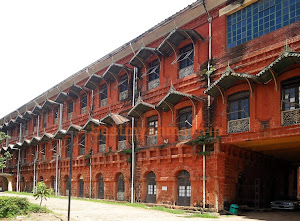The city even in constant decline, still show some imperial architecture.
The present days are one of the reasons for travel to Myanmar, to experience the old orient as it was during English colonial times and before. This is like moving back with a time machine, the city today was more or less built by the English a rather a small one was there before.
Everywhere you go the legacy of the colonial British empire is visible. The English didn't compromise with this part of the East, the result were wide streets and a solid brick architecture of Victorian style and inspiration, before that most non sacred buildings were constructed in wood and Bamboo, thats the main reason that there is no much information about because they burned from time to time.
The Airport Pretty Yangon Girls The City Center Busy Nightlife Bars and Clubs
They did the same what they have done in British India, that’s the reason why here it appears very much like an Indian town. Not only by the architecture but also in the organization, the markets and the typical Indian style of concentration, means there is a quarter with textile shops, another with everything related to books and printing and so on, actually today this is floating, the old structures are vanishing only Monuments such as the Shwedagon Pagoda wont disappear.
 |
Kandawgyi Lake and Shwedagon Pagoda plus
probably the most pretty hotel in town |
 |
| Kandawgyi Palace Hotel |
These old Yangon structures were built in the 19th century
The traveler is constantly being taken back to London about 200 years ago; a good example is the Custom House at the river, the style of the building is that of the London Thames River Customs House at that time, there is still a gleaming of dark woods and brass but its constantly rotten more and more.and the outbreak of World War II in 1940.
Other interesting structures are the Bogyoke Aung San Market plus the Holy Trinity Cathedral, all typical English colonial style brick buildings.
A good example is the railway building in the center beside the Grand MeeYaHta building, MeeYaHta means railway. This is a absolute stunning brick construction in a great old style, unfortunately it is in total decay. It is a petty that a country let rot and disappear their great past.
There are several other beautiful spots showing great nostalgic architecture. At some resorts the architects have picked up this old local style, one of them is the Kandawgyi Hotel, pictured below.
 |
| Sule Pagoda |
In the city center is the Sule Pagoda,
 |
| Sule pagoda road |
people say it is about two thousand years old. The British
made this the center when they rebuilt the town. The main through roads are
full of stinking buses and small trucks who carry the people back and forward.
Almost all roads have incrustation of stalls and the people do their business
just at the boardwalk, repairing shoes, cutting textiles and eating fast food.
 |
| Eating fast food |
Along Anawrahta Road is the very center,
there are colorful markets with tropical and tempered flowers, fruits and vegetables, meat, fish, and all kind of items for the daily life plus myriads of shops selling all everything from cameras, watches, software, pharmaceutical products, which are mostly imported. |
| Flower market along Anawrahta Road |
The streets in bright sun with strolling crowds and dense
traffic are ending at the rivers and creeks. There is the inland harbor and the
more prominent the ocean going vessels moving in from the Andaman Sea, a part
of the Indian Ocean. Very close to the waterfront runs the Strand Road with the
famous Strand Hotel on the other side of the road. The area is very busy and
ocean-going vessels from about 10 000 to 15 000 tons are anchored alongside the harbor bank and in midstream.
 |
| Yangon harbor |
After conquering Burma by the British until after WW2 this was
a stopover for British vessels from India to Penang and present day Singapore.
Pagodas and Temples
 |
| Shwedagon pagoda |
The name means Bright Diamond Hued and it really looks like a mosaic of colored diamonds placed at the walls and some relief. The location is almost opposite the Defense Services Museum.



No comments:
Post a Comment